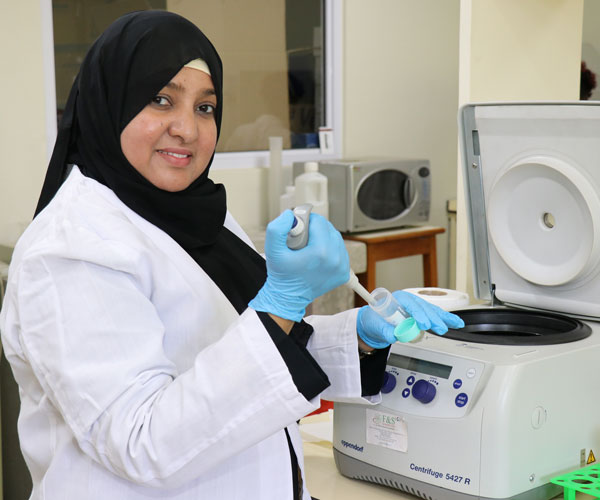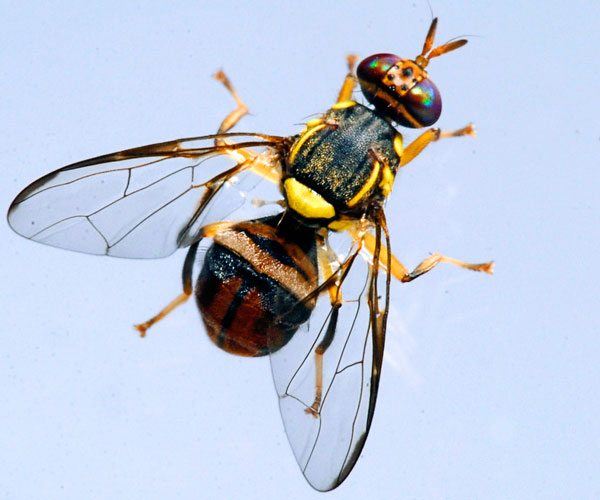
For a number of African countries, mango fruits and avocados grown by rural smallholders represent an important resource for fighting poverty and gaining food security. But there is a downside: these crops are often infested by invasive pests that reduce their commercial value.
In the last two decades one such pest, an apparently new fruit fly called Bactrocera invadens, has spread across many African countries, massively damaging the horticultural industry by spoiling up to 80% of the fruits. This has caused additional economic damage, preventing exports. Scientists have called for several approaches to contain these insects, the most important one being identifying how they entered the African continent.
"Knowing the point of entry and the way these pests spread in the environment gives scientists an important advantage," explained Kenyan molecular biologist Fathiya Mbarak Khamis, the recipient of the 2019 TWAS - Abdool Karim Award in biological sciences, whose research identified the entry point. "It allows the identification of the pests' original environment and, as a consequence, it helps find natural biological agents to control and possibly suppress them."
The award is named after TWAS Fellow Quarraisha Abdool Karim, the associate scientific director of CAPRISA, a leading centre for AIDS research in South Africa. The award, now in its third edition, is designed to honour women scientists in low-income African countries for their achievements in biological sciences.
Khamis is an experienced molecular biologist who has completed her scientific education at Jomo Kenyatta University of Agriculture and Technology (JKUAT) and Kenyatta University, both in Kenya, where she earned her master’s in biochemistry (2001-2004) and her PhD in molecular biology (2005-2009).
In 2011 she moved to the Kenya-based International Centre of Insect Physiology and Ecology (icipe), where she is currently working as a research scientist, coordinating projects that apply sustainable management strategies for achieving pest control.
Almost a decade ago, Khamis began her investigation aimed at tracking the route of B. invadens, constructing the first ever microsatellite library for this pest. Microsatellites are chunks of DNA where a specific sequence is repeated 5-50 times: scientists collect them and use them to find genetic similarities among species.
Through this technique she found that B. invadens entered Africa from South Asia, invading first Kenya, then Tanzania and other countries. The scientific paper she wrote to present her results was hailed by icipe as one of their best student papers.
But then, a new development emerged that confused the situation: another pest population from the Kaduna area in Nigeria started wreaking havoc. Was it the same species, or another variety? Was it a re-infestation case, or was there a new point of entry that needed to be identified?
Further analyses with DNA barcoding – which is the analysis of mitochondrial DNA – showed that B. invadens was closely related to another variety called B. dorsalis. This milestone result led to an important and necessary taxonomic revelation: B. invadens and B. dorsalis are, in fact, the same species.
"This achievement was very relevant from a scientific point of view because it shed light on the genetics of these pests. But it was even more important on the economic side: it eased the elimination of some trade barriers in the fruit exports, with meaningful economic benefits for local farmers," the scientist explained. If a pest is already familiar to science, in fact, scientists might already have resources to contain it and decrease the threat.
This highly desirable discovery definitively opened icipe's doors to Khamis: she was offered a postdoctoral fellowship to carry out molecular characterization of key entomopathogenic micro-organisms, a field where she is making substantial progress.
"Entomopathogens are small organisms like virus, bacteria, fungi and worms which cause diseases and kill insects, but do not cause harm to humans," she explained. "Besides, they do not leave any chemical residue behind. This is why scientists explore their use as biopesticides; that is, as control agents able to kill insects and mite pests that infest crops and forests, through a sustainable chemicals-free strategy."
Fathiya Mbarak Khamis is providing African farmers with new eco-friendly and sustainable integrated pest management strategies.
At present, Khamis is coordinating two projects with icipe. The first is part of the strategy against B. dorsalis, whereby icipe scientists have come up with a "kit" she is promoting among growers to control the spread of this insect.
"We have assembled a user-friendly tool box with five active components against the pests, and we encourage the farmers to use it," Khamis said. One component is the use of biological control agents called parasitoids that they have identified, and have been mass released into the environment: "We use natural enemies of B. dorsalis, which attack the larval and the egg stages of the pest once released into the farm," she said.
Another kit component is a pheromone. Pheromones are chemical substances that living organisms produce to attract members of the same species. In this case, the scientists couple a specific pheromone with a deadly poison. Once the male insects are lured and approach the trap and eat it, they are killed by the poison. A similar effect is triggered by another edible element of the tool kit, a food bait that attracts both males and females fruit flies and kills them.
“We also encourage the growers to use biopesticides that have been developed by icipe scientists and commercialised with private partners for wider dissemination and accessibility by growers,” she said. These biopesticides are applied in two ways: by spraying on the ground to kill the pests in the pupal stage, or through a trap with a lure and slow-killing biopesticides that enables the pest to spread the biopesticide to others of its species when, for example, they mate.
"In addition, we provide the farmers with an augmentorium: a special tent-like structure that contains the parasitoids, where they must place the fruits fallen from trees. The tent has a dual purpose: it's both a way to keep the orchard clean from rotting fruits (which are a source of re-infestation by the pest), and a way to augment the parasitoids back into the environment while the pest is killed in the augmentoria due to the heat retained in the structure," she said.
In another, similar project Khamis is making good progress in the characterization of Tuta absoluta, a South American pest that was detected for the first time in Spain in 2006 and has invaded Africa in 2008, entering through Tunisia and finding its way down to Sub-Saharan Africa.
However, her work covers a much broader spectrum of activities. Khamis is also assessing the safety of edible insects, and is mobilizing resources for new projects to integrate management practices for pests of agricultural and economic importance. Her role in organizing training programmes and building research capacity in Africa through mentoring also contributed to her receiving the award.
Receiving the prize was "the happiest moment in my life!” she said. “It is not only a highlight in my scientific career and an important recognition, but also a personal reward as a scientist. My director general, Dr. Segenet Kelemu, who is very encouraging to young and upcoming scientists, my supervisors and mentors and my institution will be very happy.”
The award will be instrumental in reinforcing an ongoing collaboration that the scientist built during her PhD training from 2008 to 2009 at the University of Pavia. "The collaboration with Prof. Anna Malacrida, an expert in insect genetics, never stopped. We built a network of researchers working hand in hand between Europe and Africa, and involving other national partners in Kenya, Tanzania, Uganda, Ethiopia and many other countries in southern and west Africa working with ministries of agriculture and regulatory bodies."
Liaising with Ministries of Agriculture personnel is now an important part of Khamis's work. "When we do dissemination among farmers and invite them to use our research kits we need approval from authorities. This is where TWAS's Award can be very useful."
Cristina Serra

